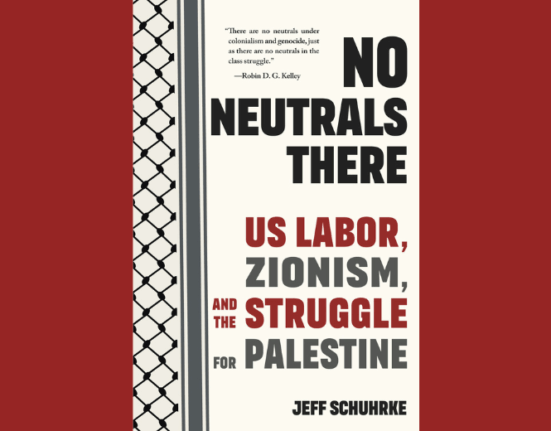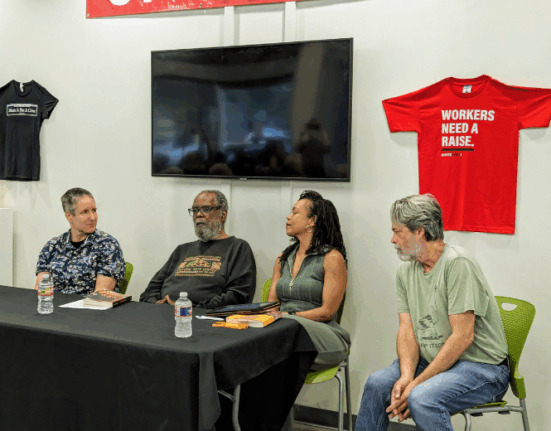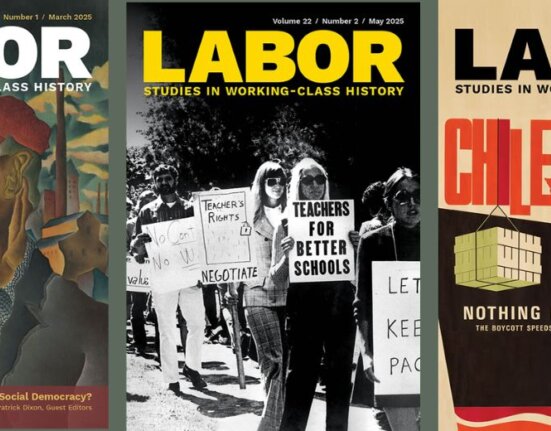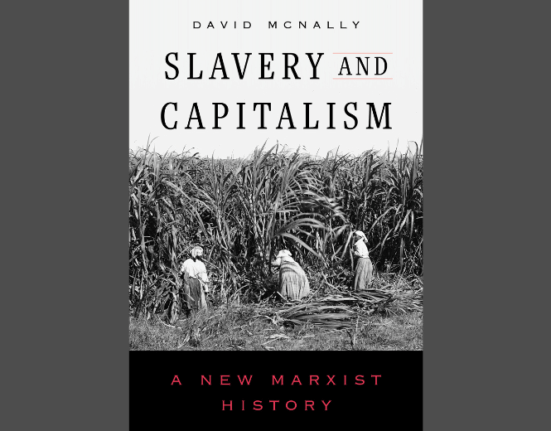We received the following post from Kim Scipes, objecting to Jeff Schuhrke’s essay about the AFL-CIO’s foreign policy, posted November 22. Schuhrke’s reply to Scipes follows. -ed.
A Response to Jeff Schuhrke’s “From Solidarity to Shock Therapy: The AFL-CIO and the Fall of Soviet Communism” — by Kim Scipes
Jeff Schuhrke’s November 22, 2022, article on “The AFL-CIO and the Fall of Soviet Communism” is interesting but ultimately unsatisfying. He gives Lane Kirkland—at that time, President of the AFL-CIO—a legitimacy that certainly deserves challenge, despite Schuhrke getting some important details correct: it’s this larger context and projected understanding of the AFL-CIO’s foreign policy that is missing—and distorts readers’ understanding of the larger issue of labor imperialism.
Schuhrke’s story basically starts off with seeing the fall of “communism” as being good, and tells the role of Solidarnosc, the Polish trade union known in the west as “Solidarity,” in events in Poland and their impact on the USSR, leading to its dissolution. He notes that “Solidarnosc’s greatest international ally was the AFL-CIO.” He tells of the AFL-CIO’s efforts to support Solidarnosc. He tells of the AFL-CIO’s role in helping to get the National Endowment for Democracy (NED) established by Congress, suggesting that NED was anything but evil, which it truly is. Rah, rah, rah. But then Schuhrke reports that the fall of “communism” resulting in “shock therapy” in the East: “In the years after shock therapy was introduced, unemployment in Poland soared to 20 percent (higher for younger workers), poverty increased, and industrial output declined. The standard of living for many working-class Poles became worse than it had been under communism.” He further noted, “The same pattern played out in post-Soviet Russia under Boris Yeltsin.” Oops, my bad!
There are four main problems with this article: (1) it treats Kirkland as a labor leader, when he clearly was not, and his actions did not represent the thinking and desires of the labor movement as a whole; (2) it accepts the general assumption the life under the Soviet Union was so bad that anything—and I mean anything—was acceptable as an alternative; (3) it assumes President Ronald Reagan’s foreign policy was desirable and good for the people of the world; and (4) it ignores the rest of the AFL-CIO’s foreign policy, the history of which has been well-explicated.
Kirkland not a Labor Leader
Lane Kirkland was not a labor leader; he never headed a local or regional labor organization. In fact, some people would call him a labor “bureaucrat.” He worked on the staff of the AFL-CIO for many years, working his way up through the bureaucracy, and eventually winning the favor of George Meany, his predecessor as head of the labor center.
More importantly than his bureaucratic acumen, however, was his right-wing, anti-communist politics, which was in-tune with the established ideology of the AFL and after 1947, the rightwing leadership of the CIO, and then, after the merger in 1955, the AFL-CIO. The foreign policy was established by Samuel Gompers in the very late 1800s-very early 1900s, and was ideologically anti-left from the very beginning, long before the 1917 Bolshevik Revolution. The AFL opposed support for the Soviet Union after it was invaded by the Nazis in 1941—an invasion where approximately 27 million men, women and children were killed (versus about 400,000 mostly military personnel lost by the US)—and were working with parts of the US Government against the Soviet Union beginning in 1944, while the Soviet Union was still an ally of the United States. The AFL played a key role in instigating the Truman Administration’s creation of the US Empire and the Cold War between 1946-48 and afterwards. Meany was certainly central to this, both under William Green, his predecessor as president of the AFL and, then on his own, after becoming the president of the AFL-CIO. Kirkland became Secretary Treasurer of the labor center under Meany and then succeeded him after Meany’s retirement. Kirkland, it should be noted, was appointed but never elected to these positions, based on Meany’s support.
Schuhrke does not recognize three important things here: (1) that the US was not just an “ordinary” country, especially after World War II; it’s goal was to dominate as much of the world as possible, and it had the military, cultural, political, and economic power, the will to dominate by political and economic leaders, and resources to do this. Accordingly, the term that is most appropriate to describe its role in the post-World War II world is “empire.” The only part of the world in which it failed was in Eastern Europe and the USSR, although by 1949, China broke free as well. The US Empire even threatened the very existence of humanity after the successful revolution in Cuba, the defeat of CIA-organized mercenaries at the Bay of Pigs in 1961, and the invitation by the Cuban government of Fidel Castro to the Soviet military to position rocket launchers in his country; it only years later that we found out that the US had previously stationed nuclear-armed missiles in Turkey that precipitated the Cuban Missile Crisis.

Second, the AFL and then the AFL-CIO had attacked workers and pro-worker governments around the world. They participated in the overthrow of a number of democratically-elected, pro-worker governments—Guatemala in 1954; Brazil in 1964; Chile in 1973—as well as supported the later failed attempt to overthrow the democratically-elected government of Hugo Chavez in Venezuela in 2002. They supported dictatorships in the Congo, Indonesia, the Philippines, South Africa, and South Korea (and others). They worked against popular movements in still a number of other countries, and especially throughout Latin America and the Caribbean.
Third, doing this, they worked closely with the US Government, although their policies and operations were never controlled by the government; they were internal to the labor movement. Nonetheless, they actively worked with the US Central Intelligence Agency (CIA) and later, the National Endowment for Democracy (NED).
The AFL-CIO has been one of the four “key institutes” of the NED from its beginning in 1983, along with the international wing of the Democratic Party, the international wing of the Republican Party, and the international wing of its arch-nemesis inside the US, the Chamber of Commerce, and continues to serve in this position today. The NED—itself created and funded annually by the US Congress, and signed into existence by Ronald Reagan—insists it is an independent agency, which is a lie from top to bottom; acting independently from the particular political administration occupying the presidency, its mission is to advance the interests of the US Empire in general—one of its key founders admitted that its role was to do publicly what the CIA had previously sought to do “in private”—and it is set up in such a way that, short of ending its funding by Congress, no presidential administration can ever control NED even in the unlikely case that one might try.
So, while Schuhrke nods his head in a critical direction one or two times in the article, he certainly does not project the understanding that the US has been and continues to dominate the world since at least 1945. Nor that the AFL-CIO leaders think the US should dominate the world, and have worked tirelessly to make it happen, and have largely sacrificed the interests of US workers to do so.
Further, however, he doesn’t report that this is done behind the backs and without the consent of labor center-affiliated unions and their members. In fact, the AFL-CIO leadership has never given an honest, verifiable report to its members about its overseas operations.
This imperialist foreign policy is, in fact, contrary to the wishes of a significant number of union members and their representatives, and this was concretely expressed during the Meany, the Kirkland, and later Sweeney AFL-CIO presidential administrations.
In 1974, based primarily on the research of Fred Hirsch, a member of Plumbers and Pipefitters Local 393 in San Jose, CA, the South Bay Labor Council passed a formal resolution condemning the AFL-CIO’s regional organization in Latin America—AIFLD or American Institute for Free Labor Development—for its involvement in laying the groundwork for the military coup in Chile on September 11, 1973. AIFLD director William Doherty, Jr., flew to San Jose, tried to get the labor council to rescind its resolution, but was blocked; despite the strongarm political pressure, the resolution was not rescinded.
In 1986, the National Labor Committee for Labor and Human Rights in El Salvador led opposition to the Reagan Administration’s apparent plans to invade Central America, and they blocked support of that move by the AFL-CIO’s leadership.
More recently, AFL-CIO leaders undermined the decision of the 400-plus delegates to the 2004 California AFL-CIO’s Biannual Convention, who unanimously rejected the AFL-CIO’s foreign policy and operations. These delegates represented over two million California members, one-sixth of the entire AFL-CIO membership at the time. Yet their decision and concerns were overthrown when Chair of the Resolutions Committee for the 2005 National Convention in Chicago, AFSCME President Gerald McEntee, changed the California resolution from condemning AFL-CIO foreign policy to praising it; then refusing to get opponents speak on the floor of the convention, and then passing the revised resolution.
As was said before, Kirkland was no labor leader and his and other administrations’ labor imperialist foreign policy did not have the support of a considerable number of the AFL-CIO membership—and, in fact, the foreign policy leadership has done all it can to keep it hidden from the members, trying to keep their foreign activities from being known by its members.
Life under the Soviet Union was so bad that anything—and I mean anything—was acceptable as an alternative
The Soviet Union and its supporters claimed it to be a workers’ paradise, which was never true. If fact, it was a long way from that.
Yet, despite everything—especially the destruction during World War II and the rebuilding effort afterwards, the nuclear arms race, and unremitting hostility from the US and many of its allies—the Soviets built a fairly modern, scientific-based, industrial society, with an excellent education and medical system. Its people had a life expectancy of approximately 72 years, comparable to that of the United States. These are no mean accomplishments.
Plus, the Soviet Union provided support to a number of anti-colonial struggles by countries in Africa, Asia, Latin America, and the Middle East; most notably in Cuba, Vietnam, and in southern Africa
So, while there were restrictions on social activities, especially consumerism, these were not terrible societies. (And before someone goes off about repression, and yes, there was repression in the “East Bloc” countries, let us not forget the McCarthy period in the US that targeted thousands; there was and continues to be repression in the United States—just ask Native activist and longtime Federal prisoner, Leonard Peltier—although perhaps more individually targeted than under the Soviet system.)
I touch on this to point out that the anti-communism in the US was never a rational analysis of the strengths and weaknesses of the Soviet model—either toward itself or in comparison with the US—and then a following conclusion, but was ideological rejection of anything that could not be controlled by the US and its allies. This is true among US governmental leaders as well as among labor “leaders.”
And this understanding is not conveyed by Schuhrke under after the fall of the Soviet Union, when he recognizes (a little) the social devastation of these countries after the collapse of “socialism.” The fact is that life expectancy fell from 72 years under the Soviet system to 58 years in Russia in about five years, a collapse only known previously during war; they obviously lost a lot afterwards.
The Desirability of President Ronald Reagan’s Foreign Policy
Reagan was another of the anti-communist ideologues. Reagan, however, had something that no one else had: as President of the United States, and as head of the US Empire, he had ideological hegemony in the world over the Soviet leaders; the US, with all of its faults—especially including the killing of 3.8 million Vietnamese, with wounding another 5.7 million, as well as the killing of 58,000 of its citizens—was seen as more desirable than the Soviet Union. Now, much of this hegemony was gained through an empire-supporting media system and CIA efforts that continuously broadcasted the desirability of life in the US, but it meant the US could get away with many things the Soviets could not (whether they did them or not).
Tied into this—although almost never recognized—was that the Central Bankers of the US Empire were willing to let Reagan finance an incredible arms build-up to threaten the Soviets during the 1980s even though he had no money to do so; they allowed him to write $200 billion dollars of hot checks to buy war material over several years, doubling the national debt—all of the debt accumulated between 1789 when the US was founded as an independent nation to 1981, when Reagan took office—from $.9 trillion to $2.7 trillion in eight years. (Since 1981, it has grown to over $31 trillion today.).
These Central Bankers were unwilling to allow the Soviet Union the same possibility, so to keep from being militarily overwhelmed by the US, Soviet leaders chose to take it out of their societies, with deleterious results on the lives of the ordinary people. It is not surprising that the peoples of the Soviet Union and Eastern Europe turned on their leaders when this happened.
It was during this time, when Solidarnosc was created in Poland and the rising of civil society organizations across the east—and these were genuine “grassroots” movements—that the AFL-CIO leaders opportunistically used their particular position to move to support Solidarnosc. And Schuhrke got this part; without, I’d argue, understanding (or at least presenting in this article) the rest.
The Motivation for the AFL-CIO
The question that still needs to be asked, although I’ve alluded to it above, is why did the AFL-CIO leaders contribute to the fall of communism: was it because they were concerned about the working people of the Soviet Union and Eastern Europe, or was it something else?
IF the AFL-CIO leaders were concerned about working people, then why did they work everywhere else in the world to undermine the struggles of working people, especially by overthrowing democratically-elected, pro-worker governments, and why did they support dictatorships that repressed working people? Schuhrke himself notes on the front page of his article:
The [AFL-CIO’s] top officials, including President Kirkland, were ardent anticommunist and zealous cold warriors. For decades, the AFL-CIO and many of its affiliated unions had worked closely with the US foreign policy establishment—including the CIA—to undermine leftist political movements and unions (whether communist or not) in Western Europe, Latin America, Africa, and Asia.
Well, then, why is he trying to wipe the dog feces off these same people’s faces?
The evidence is unequivocal: the AFL/AFL-CIO foreign policy has been a project of labor imperialism, where the US labor center has tried to dominate labor movement around the world. Regardless of rhetoric utilized and projected, these so-called labor leaders have done all they could by undermining progressive labor efforts around the world so as to not allow challenges from labor movements to threaten the existence or well-being of the US Empire.
Their efforts to support Solidarnosc, therefore, must be seen as an aberration to their 100-plus years of labor imperialism—and it was not done to advance the interests of working people, but to advance a reactionary anti-communism that has undermined progressive struggles in the US and around the world.
The proof: Schuhrke details it himself (without this clarity) in his article, talking about the social devastation after the fall of communism in eastern Europe and Russia. He also “mentions” the failure of the AFL-CIO in the United States itself since 1980.
In short and in conclusion, despite knowing much of what I’ve said herein—we’ve had several personal interactions over the last few years—Schuhrke presents this AFL-CIO operation totally out of context and without questioning much of their efforts and motivations. The way it is written, I could see this article serving as an ejaculatory celebration for labor imperialists, and especially including top level foreign policy leaders of the AFL-CIO and their supporters today. I hope Dr. Schuhrke will reconsider how he approaches this in his forthcoming book, which I’m eagerly awaiting.
Jeff Schuhrke Replies:
My essay, “From Solidarity to Shock Therapy: The AFL-CIO and the Fall of Soviet Communism,” is admittedly limited and far from perfect, and like any scholar or writer, I welcome feedback and criticism. Unfortunately, Kim Scipes’s supposed “criticisms” of the article are blatantly baseless. Apparently having no real issue with the article I wrote, he instead attacks a non-existent article he invented in his own imagination but oddly ascribes to me.
Scipes begins by falsely stating that I portray the collapse of communism in the Soviet Union and Eastern Bloc “as being good.” He then devotes entire sections of his response to falsely alleging that my article argues that “life under the Soviet Union was so bad that anything—and I mean anything—was acceptable as an alternative” and that “President Ronald Reagan’s foreign policy was desirable and good.”
In reading those sentences, I wondered what article Scipes actually read, because I argue no such thing. Not even remotely. If I did, perhaps Scipes would have been able to offer at least a single example of me doing so, but he does not. He is making things up. It’s true that my essay does not simplistically state that the abrupt end of communism in Eastern Europe and the USSR was “bad” or that Reagan’s foreign policy was “bad.” Instead, I endeavor to show the reader what happened: intense US meddling followed by mass immiseration. On shock therapy in Poland, I write: “The standard of living for many working-class Poles became worse than it had been under communism.”
It is astounding that Scipes could read that sentence and think that I’m suggesting the fall of communism was something “good,” or that I’m arguing that “anything…was acceptable as an alternative.” In fact, he seems to understand (and agree with) the core argument I make about anticommunism spawning working-class suffering, but he condescendingly assumes that I’m merely making this argument on accident, writing “Oops, my bad!”
Another bizarre point of argument in Scipes’s response is that my article grants AFL-CIO President Lane Kirkland “legitimacy” and “treats Kirkland as a labor leader, when he clearly was not, and his actions did not represent the thinking and desires of the labor movement as a whole.” It is true that I occasionally use the words “leader” and “leadership” when referring to Kirkland (though I mostly use the term “official”), but I think any rational reader would understand by that I only mean that he was the president of the AFL-CIO.
I do not at any point state nor suggest that Kirkland’s actions were representative of every union official or of rank-and-file union members. My article does not purport to be about the entirety of the US labor movement, only about the leaders of the AFL-CIO, which Kirkland obviously was. Further, my essay does exactly what Scipes says it does not do. It demonstrates Kirkland’s right-wing tendencies by showing how he took a harder line against Poland and the USSR than even Reagan, explains that Kirkland was effectively forced out of his position in 1995 by a group of disgruntled union presidents, and shows that upon his death, he was eulogized “more for his anticommunist internationalism than for any particular labor advocacy at home.”
In other articles I have published, as well as in my forthcoming book, I depict the frequent internal conflicts within organized labor over the AFL-CIO’s foreign policy, including the heroic role played by dissenting figures like Fred Hirsch and Scipes himself. This particular article, however, was not about US labor’s internal conflicts, nor was it attempting to detail the full history of US labor’s imperialist activities. It was only about the role of AFL-CIO leaders like Kirkland in the end of the Cold War in Eastern Europe and the USSR during the 1980s and early 1990s, and the consequences. Perhaps not understanding the focus of my article, Scipes rather unfairly accuses me of “ignoring the rest of the AFL-CIO’s foreign policy.”
Nevertheless, I did state early in the article that “For decades, the AFL-CIO and many of its affiliated unions had worked closely with the US foreign policy establishment—including the CIA—to undermine leftist political movements and unions (whether communist or not) in Western Europe, Latin America, Africa, and Asia.” Scipes quotes this sentence but then preposterously accuses me of “trying to wipe the dog feces off these same people’s faces,” again without ever offering a single example of me doing anything even remotely like this.
Scipes also very strangely seems to think that my essay is somehow cheerleading the National Endowment for Democracy (NED), accusing me of “suggesting that NED was anything but evil, which it truly is. Rah, rah, rah.” Here, again, I wondered what article he was reading. As with the demise of Soviet communism, my article admittedly doesn’t make the sort of simplistic statements Scipes wants (“good” or “evil”), but instead assumes readers are intelligent enough to make such moral judgements themselves when offered some historical evidence. On the NED, the historical evidence my article provides demonstrates that the endowment was created to essentially serve the same purposes as the CIA (only overtly instead of covertly) and was the child of an unsavory alliance between the AFL-CIO, anti-union Republicans like Reagan and Orrin Hatch, hawkish neoconservatives, and anticommunist social democrats. How Scipes could have read this and come away thinking that my article gives the NED a positive spin defies explanation.
For around thirty years, Scipes’s prolific scholarship has been highly useful to all those interested in labor internationalism and the imperialist foreign policy of the AFL and AFL-CIO, and this continues to be true. With me, he has been most generous in his time and willingness to share insights and resources, something I deeply appreciate. But he regrettably also has a negative reputation among many researchers I have met, in large part because his style of “criticism” too often takes the form of unfounded attacks centered on obvious distortions and falsities. His response to my article is no exception.






